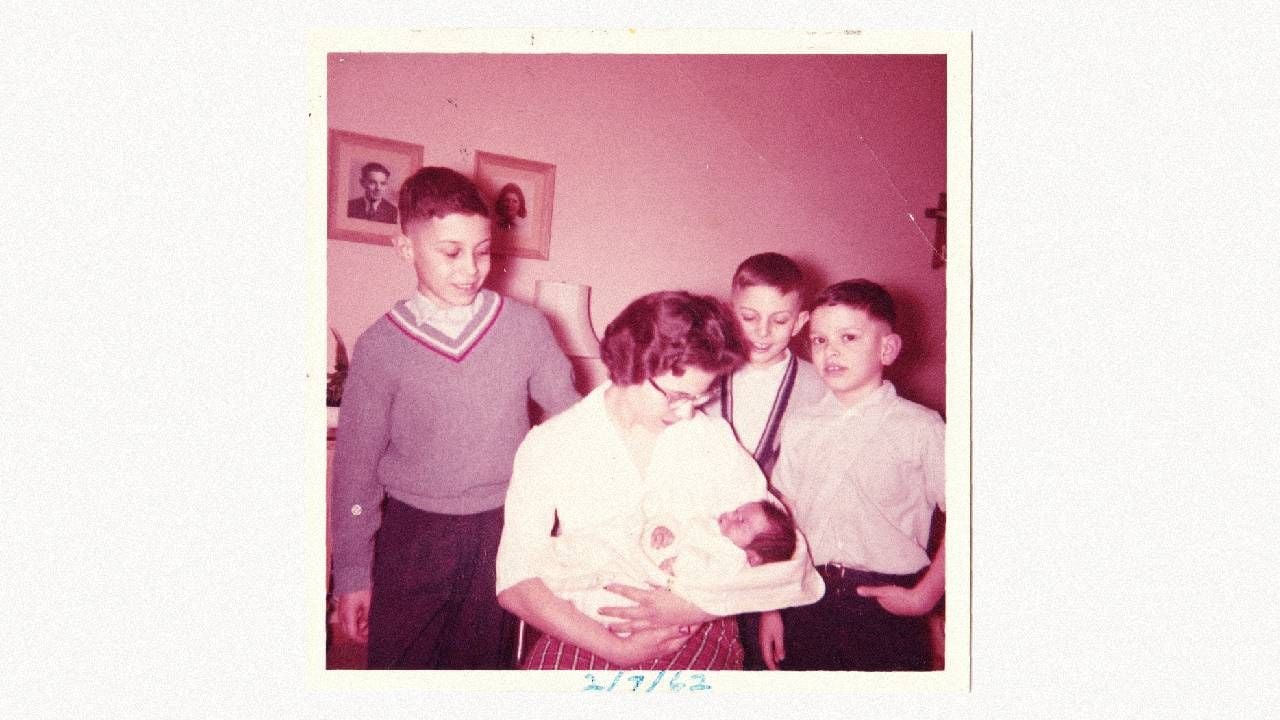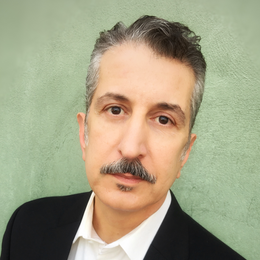Caregiving Caused Me to Divorce My Siblings
Left to care for my mother without my family's help, I wasn't willing to offer them forgiveness
The moment I met my siblings was, like so much of my early life, captured on film.
In the yellowing snapshot, my 15-year-old sister holds me, swaddled and awake. We stare into one another's eyes as my two eldest brothers look on with uneasy smiles. The brother whose place I've usurped as youngest glances nervously at the camera.

Our mother, determined to prove our perfect lives with her Brownie Swinger, staged this heartwarming home-from-the-hospital photo some 60 years ago. Pasted onto the crumbling first page of my baby book, one of many Mom compiled for each of her five children, this picture tells a story she held dear: "We were a family; everyone loved one another; here is the evidence. Remember?"
Faced with her illness, my siblings made it clear they weren't going to help Dad and me care for her.
As Alzheimer's disease overtook her, my mother was the first of us to forget these things. Memories of her happy marriage to my kindhearted father faded; a lifetime of clever housewifery and attentive motherhood left her. She didn't recall moving from Ohio to Arizona; forgot the children she'd doted on, whose every milestone she'd preserved in Kodachrome.
People often told me how sad it was Mom didn't recognize her kids, but I was glad. It meant she didn't notice that four of them were missing. Faced with her illness, my siblings made it clear they weren't going to help Dad and me care for her.
'Slacker Siblings'
I wasn't alone.
During the 15 years I spent as my mother's primary caregiver, I heard this story endlessly from strangers and friends: "I'm caring for Mom (or Dad) and none of my siblings is lifting a finger." Sometimes, the deserted parent in the story had been an ogre; more often, they'd been, like my own mother, beloved by all her kids.
"So, this is a thing, right?" I ask my friend Deanne, who runs family caregiver support groups at a Phoenix-based nonprofit that serves older adults. "People in your groups talk about being abandoned by their siblings?"
"It's totally a thing," she assures me over the phone. "It comes up at every meeting. We call them 'slacker siblings.'"
Deanne, whose brother helped her care for their parents, has decided these slackers come in three varieties: Those who are totally absent; those who only offer criticism and those who accuse their sibling of swiping their parents' money.
"Do I get a prize for having all three?" I ask, and we both laugh.
I tell Deanne I bet she hears the same excuses all the time.
"Let's see," she says. "There's 'I don't want to see Dad like that. I want to remember him as he was.'"
"How about 'She doesn't recognize me, anyway, so what's the point?'" I ask.
"Yes," Deanne says. "That one's popular. So is 'I can't help out, I have to work.'"
Without Help, A Difficult Job Is Even Harder
"Right," I say, "because caregivers don't work. When I became a full-time caregiver, a magic fairy appeared and handed me a giant box full of money so I could quit my job."
"Which excuse did your siblings use?" Deanne asks.
"They made up their own," I boast. "It went, 'We wanted to help, but Robrt wouldn't let us.'"
I tell Deanne my theory that modern American culture supports a me-first mindset, encouraging us to choose an easy life over helping Mom exit hers.
"I'm Greek," Deanne reminds me. "In my culture, caring for parents is expected. My grandmother lived with us for years. I see that practice in other ethnic groups, but it's dying out in all cultures. Right now, about seventy percent of our members say their siblings don't help them care for their parents."
Which makes an already difficult job even harder, I point out.
"You mean because on top of being bombarded with medical issues, battling insurance companies, dealing with respite workers and watching your parents die —"
"— your heart is breaking," I interrupt, "because you thought your siblings cared about you and about your parents, and it's clear they don't."
I ask Deanne what can be done to fix the slacker sibling problem.
"Keep talking about it," she replies. "Maybe that will lead to people understanding how caring for parents isn't one child's job."
"Perhaps," I tell my friend. "But I doubt it."
The Last Holiday Together
There's no photograph to memorialize the moment I divorced my siblings and their spouses. If there were, it would be a snapshot of my parents and me, taken on an Easter Sunday more than a decade ago while both my mother and father were still alive.
We'd be eating cold ham from paper plates and wearing troubled expressions — Mom because she's not sure where she is; Dad because we've arrived late for brunch to discover everyone had eaten without us; me because it's finally sunk in: None of these people at this party is going to change their mind and start helping me care for Mom.
"Oh, how awful," people sometimes say when I mention I've rarely spoken to my family since that day. "Maybe you guys can patch things up."
I'd sooner die. I left because there was no place in our family for my heavy heart. And because I knew that staying would mean playing by the family rules: Don't talk about the bad stuff. Act as if it never happened. Invent a story that obscures what you're ashamed of.
Keep everything as pretty as a picture.
The Excuses of Others
My family didn't invent gaslighting, but we've perfected it.
Our devotion to duplicity confused me as a kid. Caught in a lie, I'd get sent to my room, but it was okay to pretend Great Uncle Tony was an unmarried hero who'd been "gassed in the war" and not a schizophrenic and (horrors!) a divorcee.
Fibbing was a venial sin, but if your brother walked out on his wife and kid to shack up with a heroin-addicted cocktail waitress, it was best to pretend he hadn't. There were no pregnant brides in our family, and no homosexuals, either — just a lot of women who gave birth prematurely to nine-pound babies and a dozen or so middle-aged "bachelors" who "hadn't met the right girl yet."
Worn out by full-time nurse-maiding, I stopped calling family meetings, hoping to convince the others to help, and began yelling. That didn't work, either.
"My kids are all pitching in!" my father would tell anyone who asked, because it was easier than admitting my husband and I carried the caregiving burden while the others made excuses. To me, he complained that his daughter had blown town; his eldest son had vanished altogether. The other two stopped by for quick visits once a week, Dad whined, but visiting wasn't caregiving.
He wept when I suggested we hire a care agency to take some of my shifts.
"I got five kids living in this town," he told me more than once. "I shouldn't have to pay strangers to take care of your mother."
Worn out by full-time nurse-maiding, I stopped calling family meetings, hoping to convince the others to help, and began yelling. That didn't work, either.
"I'm sure they were relieved to see me go," I tell my friend Hank. I figure he, a licensed counselor with a Master's in sociology, ought to have some insight into why I feel abandoned by my family
"You feel abandoned by your family," Hank says, "because you were abandoned by your family. You were told families stand together, especially yours, and it turned out not to be true. You were betrayed."
When I tell Hank I don't want to be the victim in my life story, he suggests reframing my abandonment.
"It existed. See it as a tragedy you can't erase and figure out how to live with it."
I promise Hank I'll try.
Less Angry, But Not Willing to Forgive
After we hang up, I head to the internet where I read an article about "within-family variability" that suggests letting go of expectations, and another about "caregiver sibling resentment" that says honest communication is key but nothing about how to talk to people who never showed up in the first place and who prefer to prevaricate.
I slog through a scholarly study discussing sibling rivalry, but it isn't relevant; my siblings and I never quarreled before Mom got sick.
I admit that, while I don't miss my family, I do sometimes miss the story we used to tell, the one about a bunch of people who loved one another no matter what.
I'm halfway through a report on something called "the dynamics of family shame" when my friend Stuart calls. "Are you still writing an essay about siblings who refuse to help care for their parents?" he asks. "I hope so."
Stuart's mother recently became ill and requires constant care; his brother and sister aren't helping, and Stuart's looking for a way to stop being mad at them.
"They treat me like a servant," he says. "My brother offers lame excuses and my sister makes it clear my feelings don't matter and my life is unimportant."
I plead with Stuart to tell his siblings how he feels. "It won't change their minds about helping you, but it's important they know you're in pain. Do it for yourself," I say.
"When did you stop being angry at your siblings?" Stuart asks. "When were you able to forgive them?"
"I haven't," I reply. "I don't."
I admit I'm less angry than I used to be, but that forgiving my family feels like a pardon I'm not willing to give.
I want to be largehearted, I tell Stuart. I admit that, while I don't miss my family, I do sometimes miss the story we used to tell, the one about a bunch of people who loved one another no matter what.
I don't mention that I still tell that story, but only to myself.
I know it's a fairy tale. The people in my story aren't the sort to abandon their mother because she's old and needy or shove their little brother off a cliff rather than take his hand.
They smile quietly from the pages of old photo albums, tucked into a cupboard in my den, waiting to welcome babies and perfecting their pledges of loyalty.


